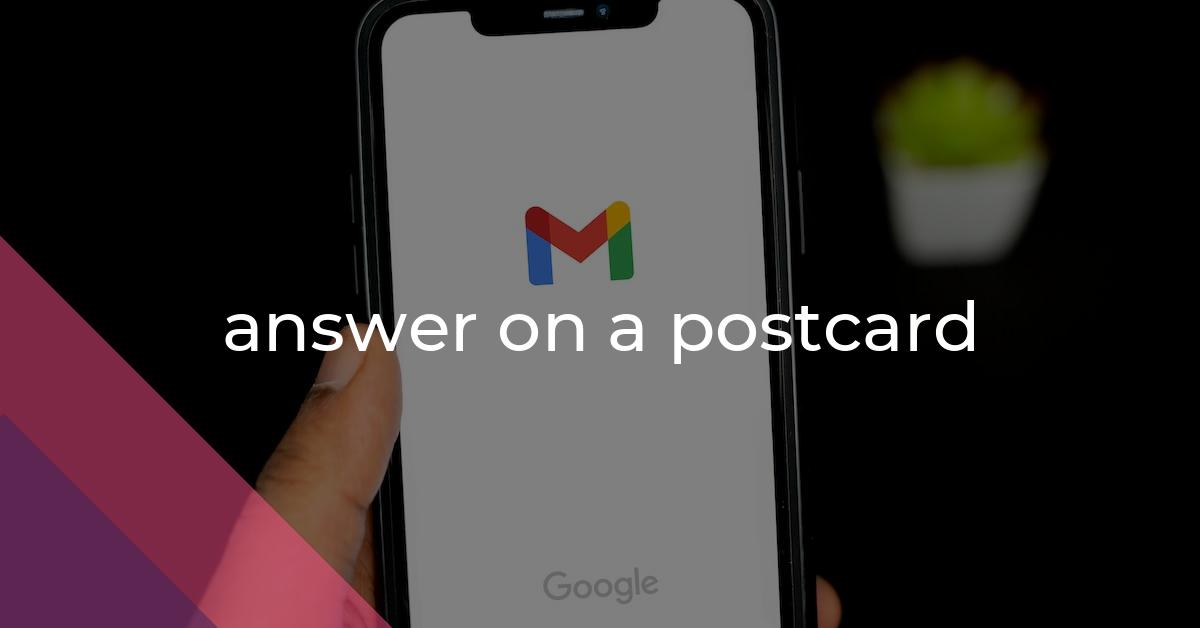answer on a postcard: Idiom Meaning and Origin
What does ‘answer on a postcard’ mean?
The idiom "answer on a postcard" is used to suggest that a simple or obvious answer is being sought. It implies that the answer should be brief and written down, as if it could fit on a postcard.

Idiom Explorer
The idiom "keep one's cards close to one's chest" means to keep one's thoughts, plans, or intentions secret or hidden in order to maintain an advantage or not reveal too much information.
The idiom "jot down" means to quickly write or make a brief note or reminder.
The idiom "in words of one syllable" means using simple and straightforward language to explain something complex or difficult so that anyone can understand. It emphasizes the use of short and easy-to-understand words to avoid confusion or misunderstanding.
The idiom "in the post" means that something is certain or guaranteed to happen, often in a sporting context. It refers to the notion that a ball that has been hit is already on its way towards the intended target.
The idiom "in the cards" means something is likely to happen or is destined to happen.
The idiom "in other words" is used to introduce a rephrasing or clarification of something that has just been said or written, providing an alternative wording or explanation.
The idiom "in a nutshell" means to give a concise summary or explanation of something. It originates from the practice of summarizing important details in a few sentences and placing them inside a nutshell, a small nutshell being a symbol of brevity.
The idiom *I'll tell you* is used to grab someone's attention or emphasize a point before providing information or sharing an opinion. It signals that the speaker has something important to say or wants to share insight.
The idiom "I'd say" is used to express an opinion or estimate based on one's judgment or perception, often without definitive or factual evidence. It signifies a personal assessment or guess about a situation or statement.
The idiom "hit the nail on the head" means to accurately identify or pinpoint the main point or issue. It is used when someone makes a statement or observation that is exactly right or correct in every detail.
The Enigmatic Insight: Postcards’ Quick Reply
The idiom "answer on a postcard" has long been used in the English language to express the idea of providing a brief and concise response or solution to a question or problem. In the past, when postcards were a popular means of communication, they were often used to send short messages or greetings. The limited space available on a postcard necessitated brevity and clarity in the messages written on them. This association between postcards and succinctness is reflected in the idiom "answer on a postcard."
When postcards were widely used, they served as a convenient method for keeping in touch, especially while traveling or on vacation. Their small and lightweight design made them easily portable, and their limited writing space encouraged senders to get straight to the point when composing their messages. This has led to the association of postcards with brevity and conciseness, which is what the idiom "answer on a postcard" aims to convey.
As an idiom, "answer on a postcard" suggests that a response or solution should be brief and to the point. It implies that there is no need for lengthy explanations or details, and that a concise answer will suffice. You may hear it used in informal or colloquial settings, and its meaning can slightly vary depending on the context.
One interesting aspect of this idiom is its occasional use in an ironic or humorous manner. Sometimes, when someone asks a question to which the answer is obvious or widely known, the idiom may be employed sarcastically. For example, if someone asks "What is two plus two?" and another person responds with a sarcastic tone, saying "Well, that's a tough one, let me think... hmm, I'll have to get back to you on a postcard." This usage serves as a playful way of highlighting the simplicity or common knowledge of the question.
It's worth noting that the usage of the idiom "answer on a postcard" may decline in the future due to the decreasing prevalence of physical postcards in the age of digital communication. As technology advances and traditional forms of communication become less popular, the association between postcards and brevity may become less relevant. However, for now, the idiom continues to be used in various contexts to convey the idea of a concise and succinct response.
The idiom "in the post" is related to the idiom "answer on a postcard" in that it also refers to communication through the mail system. When something is "in the post," it means that it has been sent, usually by mail, and is on its way to the recipient. This idiom can be used to indicate that something is expected to arrive soon, such as a package or a letter. However, it is important to note that "in the post" does not necessarily imply brevity or succinctness, unlike "answer on a postcard."
Another related idiom is "in words of one syllable." This phrase is used to describe the use of simple and easily understandable language to explain something complex or difficult. It suggests that the speaker should avoid using technical terms or jargon and instead use plain and straightforward language to ensure clear communication. While this idiom emphasizes simplicity and clarity, it is not directly linked to the brevity implied by "answer on a postcard."
The idiom "answer on a postcard" conveys the idea of providing a concise and succinct response or solution to a question or problem. Its association with postcards reflects the historical context of limited writing space, which necessitated brevity and clarity in messages. While technology may impact the usage of physical postcards in the future, the idiom continues to be used to convey the concept of a brief answer. The related idioms "in the post" and "in words of one syllable" are also connected to communication, but they do not directly imply the brevity or succinctness highlighted by "answer on a postcard."
Example usage
Examples of how the idiom "answer on a postcard" can be used in a sentence are:
- "I'm not sure what the answer is to the riddle, so I'll leave it for you to answer on a postcard."
- "The game show host challenged the audience to answer a trivia question on a postcard for a chance to win a prize."
- "The teacher posed a difficult question to the class and asked them to think about it and answer on a postcard by the end of the week."
The idiom "answer on a postcard" is used figuratively to indicate that someone is requesting a simple or concise answer to a question or problem. It implies that the response should be brief enough to fit on a postcard. The idiom is often used to create a playful or nostalgic tone. In these examples, the idiom is used in a variety of contexts, including riddles, game shows, and classroom settings.
More "Expression" idioms



